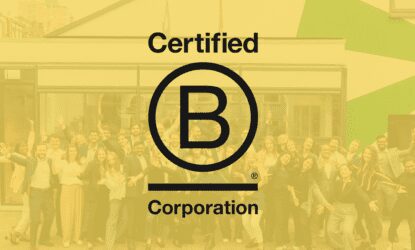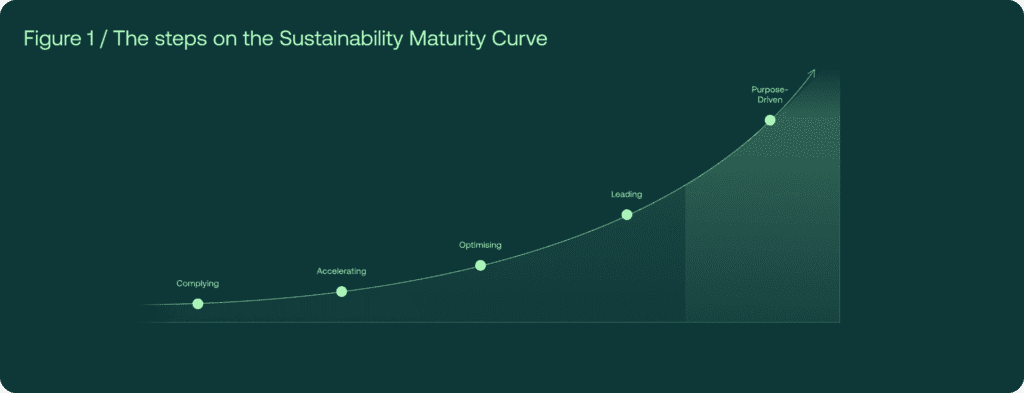 Behind the scenes: Nexio Projects’ journey through B Corp recertification
Behind the scenes: Nexio Projects’ journey through B Corp recertification
“Sustainability is not a fixed goal; it’s an ongoing journey, requiring clear KPIs and collective effort across the value chain.”
Understanding where your organisation stands in terms of sustainability is critical to making more impactful strategic decisions. Read on to discover how the Nexio Projects Sustainability Maturity Curve (SMC) can help refine your strategy and accelerate your progress.
The path towards corporate sustainability is rarely linear; more often, it’s a winding road filled with unexpected twists and challenges. That’s why it helps to have a map of your route and a ‘packing list’ of the tools and resources you’ll need. It’s also helpful to look at the experiences of those who have walked a similar road before you.
That’s why we developed the Nexio Projects Sustainability Maturity Curve (SMC). Drawing on the expertise of our sustainability consultants and the insights gained from years of collaboration with other companies, it provides a comprehensive guide for companies looking to drive progress on their sustainability journey – outlining what each stage of your sustainability journey should look like and the key milestones to aim for.
On the road to sustainability leadership
Of course, scientific knowledge and sustainability best practices are constantly evolving. To ensure that our SMC framework accurately reflects these ongoing changes, we recently undertook a complete review of the sustainability maturity stages – and the foundational key pillars of the SMC. This way, we can better provide companies with the guidance they need to drive consistent sustainability development. Below, we explore the updated SMC and what it means for your organisation.
Find out more about getting sustainability strategy support from Nexio Projects.
The six pillars of the SMC
Nexio Project’s SMC is based on the following six key pillars:
- Motivation
- Governance
- Strategy
- Business model
- Reporting
- Ratings and certifications
- Value chain collaboration
Pillar 1: Motivation
Motivation is the driving force behind all sustainability efforts for companies with a strong internal commitment to sustainability. While external pressures such as regulatory or customer demands can sometimes drive action in the first instance, as a company matures, this motivation should increasingly come from within.
Pillar 2: Governance
Accountability is critical to the success of sustainability efforts. Good governance ensures that responsibility for sustainability is intelligently distributed. A key indicator of growing sustainability maturity is a strong sense of ownership at all levels of an organisation for the successes and challenges faced on the path to improved sustainability.
Pillar 3: Strategy
Effective strategic planning is the foundation of a successful sustainability journey. By embedding sustainability into core policies and long-term goals, organisations can pave the way for meaningful change.
Pillar 4: Reporting
A strong data management system is essential for tracking progress and communicating where a company stands on key sustainability indicators. By measuring and continually refining their strategies with data-driven insights, organisations can drive consistent progress and adapt to changing conditions.
Pillar 5: Ratings and certifications
Many companies seek to validate their sustainability efforts through ratings and certifications. These independent assessments provide transparency and credibility, encouraging companies to continuously improve their practices– and enabling organisations to share evidence of their progress with value chain partners.
Pillar 6: Value chain collaboration
Sustainability challenges can’t be tackled alone. Collaboration with partners along the value chain is essential to achieve meaningful change. This collective effort can extend beyond individual companies and catalyse sustainability across entire industries.
The five stages of the SMC
Based on these six pillars, Nexio Projects consultants can assess a company’s sustainability maturity and place it in one of five stages of maturity. Companies are assigned a maturity level based on their performance in each pillar, with an overall score generated based on the individual assessments. The deeper a company’s commitment to sustainability, the further along the SMC it will be – from merely complying with regulations to becoming a truly purpose-driven organisation.

Stage 1 / Complying
Faced with external pressure, these organisations focus on meeting minimum regulatory requirements with little or no strategy beyond compliance. This reactive approach carries risks, especially as regulations continue to evolve. Companies should aim for higher levels of maturity to stay competitive and decrease future risks.
Stage 2 / Accelerating
Faced with increasing stakeholder pressure, these companies have begun to work proactively to develop a more comprehensive understanding of their impacts and key strategic focus areas – the foundations of a sustainability management system. Their efforts are often ad hoc, unstructured and decentralised, but they recognise the need to integrate sustainability alongside traditional business considerations.
Stage 3 / Optimising
At this stage, organisations have established a robust sustainability management system and are working to continuously improve their processes. Internal reporting is centralised, and sustainability efforts are well coordinated across the organisation.
Stage 4 / Leading
Leading companies have a comprehensive and structured approach to sustainability, covering their internal operations and value chain. They commit resources to continuous improvement and innovation in sustainability practices.
Stage 5 / Purpose-Driven
In this final stage, companies have fully integrated sustainability into their core business strategy. People and the planet are reflected in their value creation models, with sustainability embedded in their strategy and day-to-day operations.
Developing a robust sustainability management system
Using the Nexio Projects SMC to guide sustainability progress helps organisations address the following key areas:
- Clarity: what is your current sustainability situation, and how do you compare to your peers?
- Visibility: what practical actions are needed to make progress?
- Engagement: how are stakeholders involved in your sustainability journey?
In addition, there are four key benefits to advancing along the SMC:
- Environmental and social impact: By integrating sustainable practices, organisations can reduce their environmental footprint and make a positive contribution to society.
- Competitive advantage: Sustainable companies attract conscious consumers, committed investors and engaged talent while remaining adaptable to changing market dynamics.
- Stakeholder trust and reputation: Prioritising sustainability enhances brand reputation by fostering trust and loyalty among customers, employees and investors.
- Long-term viability and resilience: Identifying and accounting for sustainability risks makes companies more resilient to future challenges.
Your sustainability journey: Next steps
The SMC helps organisations achieve their sustainability goals by providing clear milestones, tailored to their size, sector and location. To help you drive progress on your journey, Nexio Projects provides support at every stage – offering actionable roadmaps and a range of consultancy and project management services. Start by filling in the questionnaire to discover your current position on the Sustainability Maturity Curve, and take the first steps towards making further progress on your sustainability journey.











